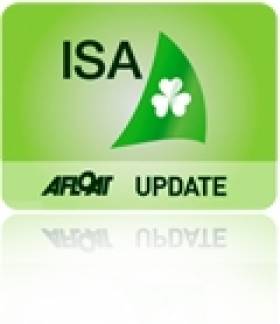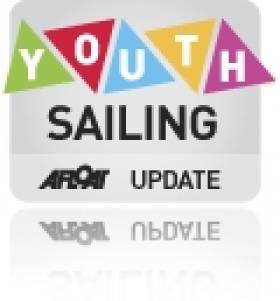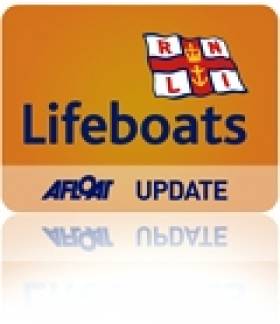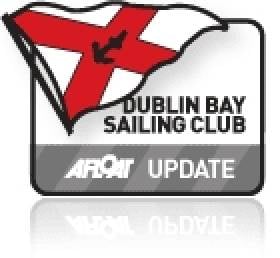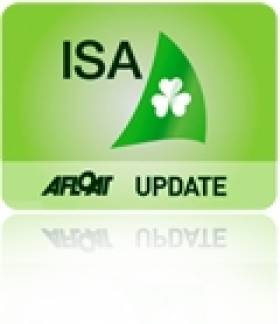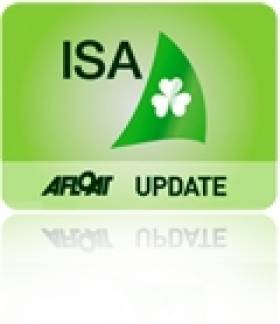Displaying items by tag: Dinghy
#isa –The ISA President Niamh McCutcheon says the association's decision in 1998 to move away from utilising voluntary support has been a significant factor in the 'perceived disengagement of the membership from the operations of the ISA'. The conclusion is contained in ISA Board recommendations from March's Dinghy Sailing Forum published today (download the full recommendations as a pdf below).
The 1998 strategic plan was, however, unanimously approved by the membership and in its foreword the then president Neil Murphy expressly referred to the association's requirement for volunteer involvement 'whose contribution was crucial to the success of the ISA'. (PDF of the 1998 strategic plan foreword is downloadable below).
Today's recommendations follow the motion proposed by Norman Lee and Bryan Armstrong at the ISA AGM held on 2nd March. Following intense discussion on Afloat.ie a meeting was called to discuss the future of Small Boat Sailing and Youth training in Ireland. This meeting was held in the National Yacht Club on 23rd March.
The President says in her recommendations there are a number of action items that may help in the short term but there is no simple solution. 'The implementation of changes to the strategies and structure of an organisation such as the ISA will evolve in time, and only with the help and support of clubs, classes and training centres'.
The March forum was chaired by former ISA President Paddy Maguire, and heard strong views from another former president Roger Bannon. Over 120 (including 14 ISA Board and staff members) were present, representative mainly from the Dublin area from a wide range of Small Boat Sailing interests - clubs, training centres & classes.
Comment on this topic is welcome below
Afloat.ie Boosts Readership with 'Shake-Up of Sailing' Debate
#sailing – What started out as calls for change in Irish sailing on Afloat.ie a month ago has this week been echoed around the internet with more than a little worldwide momentum.
A boost in unique visitor traffic to Afloat.ie could not be more heartening with quality inbound links to an online debate on stemming the decline of dinghy sailing.
Over the course of a month from February 26th 12 separate stories on the topic generated over 11, 000 readers.
The message is very clear. Grassroots sailing needs to be revitalised and if this is energised correctly the general improvement in standards will produce world class sailors.
In early March, thanks to the efforts of a group of passionate dinghy sailors concerned over the lack of recognition for senior dinghy fleets by the Irish Sailing Association (ISA) has grown internationally to highlight some serious deficiencies in the management of the most exciting sport in the world, yacht racing.
A full 'shake–up' for Irish sailing is now on the agenda for 2013 after dinghy champions took aim at current policies they claimed are 'damaging the sport'.
The meaningful online discussion on Afloat.ie was heartfelt. The constructive comments from sailors at home and abroad will be important for the future direction of the sport.
Now it is hugely supportive to see former world sailing president Paul Henderson adding to the chorus that calls for a renewed emphasis on dinghy sailing and encouraging a broader base of participation in the sport.
Henderson correctly focuses on kids being ignored who may never be Olympic helmsmen but still want to get out on the water crewing.
It is also interesting that some notable leading yachting publications have so far studiously ignored the debate despite being well aware of it, this is probably more a sign of vested interests!
But all that is changing now the likes of Henderson has shared his thoughts on the elements that grew the sport of sailing over the past four decades, and what he believes is holding sailing back today it is clear change at home and abroad is well overdue.
Aside from the expense of new boats and the emphasis on single-handers and college sailing that prioritises the most elite athletes, the Canadian sailing hand also believes yacht clubs in North America "have forgotten what they are about... [thinking that] regattas should be a profit centre, rather than the hosting the sailors cheaply as the raison d'etre of a yacht club."
These comments come after former ISA president Roger Bannon's candid assessment of the state of sailing in Ireland today.
According to Bannon, the "importance of supporting elite and Olympic sailing" must become "a subsidiary focus to the main objective of getting people sailing competently and safely in whatever boat they wish".
The ISA today is finalising the recommendations of its board meeting held last night. Its Chief Executive has promised to effect change and wants a closer working relationship between the clubs and classes.
Busy Days For RNLI Lifeboats In Co Down
#RNLI - Newcastle RNLI’s always-on-call lifeboat crew had to abandon their buckets and sponges during a fundraising car wash at the weekend to respond to an emergency at the Co Down town’s harbour.
The RNLI volunteers were busily soaping and rinsing cars for their annual Easter fundraiser on Saturday when they were alerted to a woman in trouble in the freezing water a few yards from one of the piers.
The car wash was immediately abandoned and within minutes the inshore lifeboat Aldergrove II was launched and rushed to the woman’s aid.
At the same time, crew member Shane Rice grabbed a lifebelt from the pier and jumped into the water to assist the woman. He kept her afloat while the Aldergrove II came alongside.
The woman was helped into the rescue inflatable, wrapped in blankets to prevent hypothermia, and taken back to shore where an ambulance was waiting to take her to hospital.
Newcastle RNLI’s deputy launching authority Clifford Moorehead said afterwards: "The lifeboat crew are always ready to respond in an instant to any emergency. It is fortunate that the car wash was in progress at the time and the crew members were on hand to swiftly deal with this case.
"After the rescue the crew members came back to the harbour and resumed their car wash. It’s just all in a day’s work for the RNLI."
It wasn't the only callout of the weekend for the RNLI in Co Down, as Bangor RNLI assisted a lone sailor who got into difficulty on a sailing dinghy Easter Sunday.
At 1.10pm the volunteer lifeboat crew received an urgent request from Belfast Coastguard to launch the lifeboat and rescue one person from a 17ft dinghy.
The sailing dinghy had reportedly gone aground on ‘Cockle Island’ off Groomsport Harbour on the southern shores of Belfast Lough.
Upon arrival at the scene, the volunteer crew found that the occupant onboard the dinghy had been assisted by another boat owner and the vessel had been safely tied to a mooring buoy.
Meanwhile, last Wednesday evening Portaferry RNLI was launched to reports that red flares has been sighted on Strangford Lough off Kircubbin in Co Down.
They were joined by a coastguard team that searched the shoreline and after some time recovered a spent flare casing. The inshore lifeboat and its volunteer crew were stood down after a number of hours with the callout proving to be a false alarm.
Portaferry RNLI lifeboat operations manager Brian Bailie said: "A member of the public acted in good faith ... alerting the emergency services to what they understood to be a distress flare on the lough."
He reiterated that flares "should only be used in emergency situations".
Dublin Bay Dinghy Sailors Plan Famous Landmarks Race
#dbsc – Dublin Bay sailors Paul Keane and Hugh Sheehy have announced plans for a unique sailing event in Ireland this coming sailing season.
The Island Trial, an open sailing time trial on a fixed course in Dublin Bay was first announced on Sunday 23rd March to the local dinghy sailors who had gathered to collect prizes and wind up the 42nd Dun Laoghaire frostbite season.
The 11km fixed course utilises famous local landmarks and Dublin Bay racing marks which are laid on the bay from Mid April to October each year.
What makes the event truly unique is that to enter sailors must provide a GPX tracking file which verifies the course sailed and the start and finish times. This means the course is open every day (and night) and sailors can decide when they would like to have a go.
At the moment there are two prizes up for grabs. First is the Bragging Rights Cup for the outright record which is being eyed up by the local moth and skiff fleet, although some big boats may have a chance too.
Then there's the Handy Sailor Silver Salver - the trophy for the winner on corrected time - which highlights the skill of the crew, no matter what their boat. Other prizes such as a junior trophy will be added as the event progresses.
The event has piqued the curiosity of many and several sailors visiting Dun Laoghaire for the biennial 4 day regatta in July will have a go at the trial. All boat types are welcome, from foiling moths to MOD-70s.
Dun Laoghaire Fireball Frostbite Finale blown away!
#fireball – The 42nd Frostbite Series promoted, managed and hosted by Dun Laoghaire Motor Yacht Club, came to a disappointing close yesterday when high winds made racing impossible writes Afloat's Fireball Correspondent Cormac Bradley. While we have not had the heavy snow that has cut off parts of N.Ireland and the UK, we have had very strong winds blowing here since the previous Thursday. Nobody in their right mind would have contemplated going out on Thursday past such was the state of the sea and while the wind seemed to have abated slightly on Friday and Saturday, it came back with a vengeance yesterday.
So rather than racing yesterday, the prize-giving for the Series was brought forward to 14:30!
DMYC's Sailing Secretary, Neil Colin, opened up the proceedings by introducing the DMYC Commodore Liam Owens. Liam commended the Frostbite community for their hardiness in sailing throughout the winter months and indicated that the DMYC would continue to support as much sailing as could be accommodated in the context of the proposed harbour development plan. He said it was very encouraging to see so much use being made of the harbour by the Frostbite Series.
Frostbite Organiser, Olivier Proveur expressed his appreciation to all those volunteers who had contributed of their time to make the series possible. He made particular mention of Race Officer Kevin Cullen who had not missed a single race of the 42nd Series. He also thanked the rescue crews who double up as the mark layers and gave special mention to the catering staff of the DMYC who were available every Sunday, including the St. Patrick's Day, this year, to look after the Frostbiters après racing.
Going into the last race of the Series, Noel Butler and Stephen Oram were two points behind Kenny Rumball and David Moran despite the fact that the former combination held an 8pt advantage in the second Series. Thus, leaving the Club the previous Sunday we all had an expectation of a match race between the two boats to determine the winner of the Series overall. Both combinations are well capable of sailing the opposition "down the pan" to try and gain the necessary advantage in this situation but the weather didn't "play ball". Thus the positions as advised in this report last week remained.
42nd Frostbite Series by DMYC – Series 2 (Post Christmas) – Overall.
1 Noel Butler & Stephen Oram 15061 DMYC 9pts
2 Kenny Rumball & David Moran 15058 INSC 17pts
3 Connor & James Clancy 150** RStGYC 19pts
4 Neil Colin & Margaret Casey 14775 DMYC 29pts
5 Louise McKenna & Hermine O'Keeffe 14691 RStGYC 36pts
6 Gavin Doyle & Dave Sweeney 14950 NYC 54pts
7 Luke Malcolm & Shane Divinney 14790 Howth 60pts
8 Mick Creighton & Joe O'Reilly 14937 ISA 64pts
9 Frank Miller & Grattan Donnelly 14713 DMYC 73pts
10 Andy Boyle & Brian Flahive 14934 RIYC 74pts
42nd Frostbite Series by DMYC – Overall (Series 1 & 2: Pre & Post Christmas).
1 Kenny Rumball & David Moran 15058 INSC 17pts
2 Noel Butler & Stephen Oram 15061 DMYC 19pts
3 Connor & James Clancy 150** RStGYC 32pts
4 Neil Colin & Margaret Casey 14775 DMYC 56pts
5 Louise McKenna & Hermine O' Keeffe 14691 RStGYC 75pts
6 Alistair Court & Gordon Syme 14706 DMYC 91pts
7 Gavin Doyle & Dave Sweeney 14950 NYC 91pts
8 Louis Smyth & Cormac Bradley 15007 Coal Harbour 111pts
9 Mick Creighton & Joe O'Reilly 14937 ISA 118pts
10 Luke Malcolm & Shane Divinney 14790 Howth Yacht Club 122pts
For the Fireball Class, there is now a short break before we get into summer (!!!!) mode. Our first event post-Easter is an Adam Bowers training weekend hosted by the DMYC over the weekend of 20/21st April. Thereafter, we have events in May, June, July (2) and a season closing event in September. The Worlds are also scheduled for Slovenia in September.
At the conclusion of the prize-giving a number of dinghy initiatives were announced by Hugh Sheehy (OK Dinghy) to try and entice lapsed sailors back onto the waters of Dublin Bay and the burgee of the Dublin Bay Sailing Club who organise racing during the summer months. Under the umbrella organisation of Dun Laoghaire Dinghies and making use of the Internet, Facebook and Twitter Hugh and a number of DBSC dinghy stalwarts are looking at a variety of racing, coaching and social events to draw more people back into the sport in our locale.
The prize-giving was also advised that one of the stalwarts of the Frostbite and Dun Laoghaire sailing scene, Bob Hobby, suffered a slight stroke on Monday of last week. Bob's partner, Louise McKenna, was able to advise those who attended the prize-giving that Bob has suffered some complications but the medical advice is that they were not as severe as they might have been. The Fireball community, in particular, would like to wish Bob a speedy recovery and offer Bob and Louise all our support and best wishes.
This is the last of the Frostbite reports for the 2012/13 Series. I will endeavour to bring you reports from the regatta season when it gets underway in May.
#dinghy – A packed National Yacht Club (NYC) in Dun Laoghaire heard important contributions from clubs and classes right around the country this morning at a forum to revitalise small boat sailing and youth training. It is the first step on a new blueprint to stem falling numbers in Irish sailing.
Although the contributions varied from the reintroduction of junior log books to coaching support for senior dinghy classes, delegates were united in the view that the Irish Sailing Association (ISA) has to change tack if it wants to properly support the clubs and classes it aims to represent.
The meeting opened with a welcome from association president Niamh McCutheon who urged everyone to work together for the sport. It was followed by an overview of the problems in small boat sailing and how youth training can be made more relevant to clubs and classes by Roger Bannon, a former president of the association. Bannon has been openly critical of the association's performance in recent weeks. He told the meeting there are serious problems with Irish small boat sailing and that important changes are needed, some of them quite fundamental, to ensure the future vibrancy of our sport.
In many ways the packed club house was testament to his concerns that Irish small boat sailing is in trouble. The full extent of the problem was starkly put into focus with the publication earlier this week of information which showed an alarming decline in attendance figures at dinghy championships and falling participation in junior training schemes.
Former president Paddy Maguire, who chaired the meeting, asked attendees to make four minute contributions and they did not need much encouragement with passionate contributions from champions, instructors, youth sailors, University team racers, senior dinghy sailors, sailmakers, sailing school owners, club commodores and junior organisers.
Norman Lee, the GP14 sailor who originally proposed the motion for change at the ISA agm a month ago said that the ISA had started its life as the Irish Dinghy Racing Association (IDRA) in 1947 but it was now so far off course it more resembled the Concordia, a reference to the ill–fated cruise liner that ended up on the rocks last year.
There were plenty of good quality suggestions for the combining of open events and even the restaging of dinghy week to reinvigorate the small boat scene.
As has been documented on Afloat.ie over the past few weeks the meeting heard a range of contributions from up to a dozen or more delegates with applause after each contribution and included observations such as:
• Numbers participating in dinghy and small one design boats are steadily declining in both youth and adult classes. There are some exceptions, mainly in older traditional classes but unfortunately, this decline represents a fundamental underlying overall trend.
• The retention rate of junior sailors in the sport, after emerging from our training schemes, is alarmingly low, at less than 10%.
• The standard of sailing and racing skills amongst juniors is in general, unacceptably inadequate and they lack even the basic skills to participate in crewed boats with multiple sails.
• The expected natural progression of youth sailors into adult classes as they mature is virtually non-existent.
• The general standard of racing and boat handling skills in most adult classes is also considerably below acceptable levels and certainly much lower than in prior decades.
• The justified emphasis placed on elite sailing has been implemented at the expense of improving standards generally and supporting international participation in non-pathway approved classes to improve skill levels.
• The quality of our training instructors is very mixed and many of them do not have the basic sailing and racing skills to train junior sailors to even a modest level of acceptable competence. It is also incredibly expensive to obtain qualifications to become an Instructor and this dis-incentivises many who might be excellent candidates.
• The ISA is not properly engaged with its members and is devoting a disproportionate share of its resources to service interests and activities which are not relevant to the vast majority of its 20,000 members. This state of affairs has emerged despite quadrupling the staff compliment compared to the late 90's and generating in excess of €2m in annual revenue. Of course it has to be acknowledged that over 50% of this is ring fenced Government funding for our excellent elite and Olympic support programs and for financial support towards the hosting of specific major international events.
• There is a universal concern that the ISA is not providing leadership on important issues which are of the most relevance to its members including its affiliated clubs, many of which are experiencing serious challenges.
For the final item attendees were asked to submit suggestions on paper in bullet point form as to how these issues can be addressed in the short and long term. It is understood over 300 suggestions were received.
The meeting ended at 1.50pm with a commitment from the ISA to distribute minutes to all attendees and to publish its report and action plan.
Chairman & Agenda Announced for Decisive Meeting on Future of Sailing & Youth Training
#isa – Two former Irish Sailing Association (ISA) Presidents are engaged in sorting out small boat sailing and youth training problems this weekend when the ISA meets at the National Yacht Club (NYC) on Saturday to address concerns first raised at the association's agm a month ago.
Former president Paddy Maguire will chair the meeting and Roger Bannon, (the president credited with the joint membership scheme that made every member of a sailing club also a member of the ISA) will present a keynote address. It is understood the meeting will then open to the floor on the problems with small boat sailing and how can youth training be made more relevant to clubs and classes.
The meeting that has drawn considerable debate on Afloat.ie follows an ISA agm motion by Norman Lee and Brian Armstrong.
The meeting is scheduled for 10.30am in the NYC, Dun Laoghaire and is expected to be concluded by 2.00 pm.
The following agenda for the day has been agreed between the ISA and Norman Lee.
The Future of Small Boat Sailing & Youth Training – Agenda
1. What are the problems with small boat sailing and how can youth training be made more relevant to clubs and classes.
2. How can the ISA refocus to put clubs and classes at the top of its agenda?
3. How can these issues be addressed in the short term and long term?
4. AOB
Whither Irish Sailing? – Richard Burrows
#sailing – Former Irish Olympic Sailing Chief Richard Burrows has been following the debate on the future for Irish sailing and suggests the focus should be on recruiting the next generation of sailors. Writing today (as a grandfather), the 1986 Round Ireland race winner and former champion dinghy sailor is concerned that the proper fabric for training youngsters is in place.
I have followed the debate following on from the ISA meeting through the excellent facility of your Afloat updates.
The input from Roger Bannon contains much which I instinctively agree with but I do recognise that as far as young sailors are concerned I am very much out of date. However as a grandfather I look forward to introducing a new generation to sailing and I am concerned that the proper fabric for training, encouraging, and motivating youngsters is in place.
Clubs bear responsibility for this. And club members must play an active role. Junior sailing is not a babysitting service that can be outsourced to the ISA. An example of this being done well is to be found at Malahide Yacht Club. There, it comes down to active leaders on committee, great officers, and reasonable pricing. Choices about which boat are immaterial so long as the boats are safe, easily sailed, and cheap.
Roger makes some polemic comments about High Performance sailing and the funds devoted to this aspect of the sport. He won't mind me reminding him that he was in the Presidents chair when the foundation of today's policy was put in place with his full support. He is right that Olympic medals have proven to be elusive but this is just a matter of time.
At Weymouth two competitors were potential medal winners but it wasn't to be. Would this debate be taking place if medals had been won?
Yes, in my view, the two aspects of the sport are only connected by the fact that high performance sailing attracts publicity, and thus awareness of sailing. Club sailing will not produce column inches. And, spreading the funds devoted to support high performance sailing into club activities would not move the needle as the club base is so large.
So, my suggestion is to focus the debate on recruiting the next generation of sailors. And that means club members getting involved at club level. If ISA instructors are not up to it don't employ them. Charge nominal subscriptions to members under the age of 25. Embrace all forms of sailing including boards and kites. The responsibility lies with clubs. We cannot allow nanny state thinking to pervade and render clubs moribund in the expectation that the ISA will save them.
#youth sailing – David Harte of Schull Community College Sailing Club offers his views on how one secondary school in West Cork is contributing to youth sailing and the Irish dinghy scene.
I have taken on board, with interest, many of the recent letters, forums, and discussions on the present state of dinghy racing in Ireland. Whilst generating much food for thought, I would like to avail of the opportunity to mention the very positive input, that a small secondary school situated in the far south-west, contributes to the overall status of dinghy sailing, and, racing, in Ireland.
Schull Community College has 450 enrolled students, 98% of which, would come from a non-sailing background,. The College Sailing Club has 78 members. Introduction to sailing takes place in September when all 1st year students are afforded an opportunity to experience sailing. This would take the form of a fun day out with the goal that all students come back with a smile. Those interested in learning the skills, to whatever level or standard, are invited to become members of the Schull Community College Sailing Club.
The cost for membership is €100 for the year, or €150, for two, or more, family members. This fee covers Saturday sailing throughout the year (weather permitting), with instructors and coaches, and the use of a variety of dinghies to suit all skills.
Beginners are thought the skills of sailing without reference to the SBSS (ISA Small Boat Sailing Scheme). We intentionally do not use this scheme as we have found in the past, that students prioritise attainment of levels over skills.
The goals of each student are different, with some content to sail back and forth with their friends having fun, but using the proper skills to do so, while others are eager to advance to developing Team Racing skills. Progress to this stage can be achieved once the student has demonstrated a good understanding of the 5E's, and can sail around a course with little or no rudder. Saturday sailing, during the year, attracts an average of 30 sailors on a cold day to 50+ on a sunny day Team racing discipline is used at the school as it is an achievable goal with little or no personal resources required, with boats and coach supplied by the FMOEC.
"We intentionally do not use the ISA Small Boat Sailing Scheme as we have found in the past, that students prioritise attainment of levels over skills".
Students learn the advanced skills of sailing, an introduction to racing rules, and team work. A typical Saturday would involve, briefing, boat handling exercises, team racing, and de-briefing, as well as boat maintenance, and seamanship skills, etc. With team racing, students upskill rapidly, as competition for team places is continuous throughout the year. Most of the students would never have sailed outside of Schull Harbour, but, within a few years, clearly demonstrate a skill level, equal to, or above their peers from other clubs. When students reach transition year they have an extra days sailing on Wednesdays. At this stage students are divided into two groups, with one group learning to sail and the other learning the skills required to become a Dinghy Instructor. For instructorship, students attend VHF, First Aid, and Powerboat courses, and their pre-entry. At this stage, none of the students would have any SBSS levels, but, they would have the skills necessary to pass their pre-entry Most of these courses are subsidised by the FMOEC which allows the student to become an Instructor, without the burden of recourse to personal resources. Mainstream costs to fulfill all courses required to become an Instructor approximate in the region of €1,500, which, in my view, is completely ridiculous.
Most of the students who become instructors, are offered summer jobs at the centre, teaching the SBSS to the general public. Our courses run for nine weeks, and it is during this that our instructors see the downfall of the SBSS, with a sizeable percentage of students attending the courses showing more interest in the cert., rather than the skill. This in turn forces sailing clubs and centres to issue certs., as parents believe they have paid for the cert., and not the skills. Our team racing teams participate in many events throughout the year, ranging from the Munster Schools Team Racing Championships to the International Wilson Trophy.
A look at the results from last years 1st team, which consisted of six team members, of which, five came from a non-sailing background, demonstrates the achievement of the FMOEC syllabus. Irish National Champions, British U21 Champions British Schools Champions, Youth Helmsman Champion, Silver Senior Helmsman Championships, 4.7 National Champion and Silver Radial Championships. It would be easy to ascribe this success to 'an exceptional team', but, Schull teams have been Irish National Champions every year, except two, have won the British Schools Championships four times, and been in the top four over the last six years.
One may pose the question....'where do they go after they finish at Schull Community College, and, do they continue sailing?..... Follow up on team-racing participants, whether they go on to 3rd. level, or, otherwise, demonstrates a continuing healthy involvement in sailing activities. In 2011 the ITRA (Irish Team Racing Championships) were held in Schull and over 50% of the helms entered in the event were ex-Schull Community College.
In conclusion, it is my belief that the present state of dinghy racing in Schull (Ireland) is strong, and, demonstrably, getting stronger.
More on this subject of dinghy sailing here
Where’s The Olympic Glamour in Grass Roots?
#dinghy – General de Gaulle used to say that of course it was a very difficult job to govern France – what else would you expect in a country with 387 different cheeses? So when people talk of how difficult it seems to be to administer sailing at any level, the only answer is: what else would you expect of a sport with 143 World Championships?
Every class which has achieved international status is entitled to stage its own official World Championship, and boy do they cling to the privilege, even when the old boats are only hanging on by the skin of their teeth in two or three centres. As for the mind-boggling variety of those centres.....well, we just won't go there today.
Faced with this hyper-crazy kaleidoscope of dozens of very different boat types sailing in their many and often odd ways in what is a quintessential vehicle sport, casual public interest tends to focus only on the most expensive forms of sailing, or the sailing with the biggest public rows and scandals, or the sailing with the greatest danger, preferably with deaths now and again.
So that's the America's Cup, the Olympics, and the more extreme forms of offshore racing, all way ahead of the field The rest is of interest only to those taking part, their families, their friends if they still have any after becoming addicted to boats, and the occasional daft salthead like this blogger.
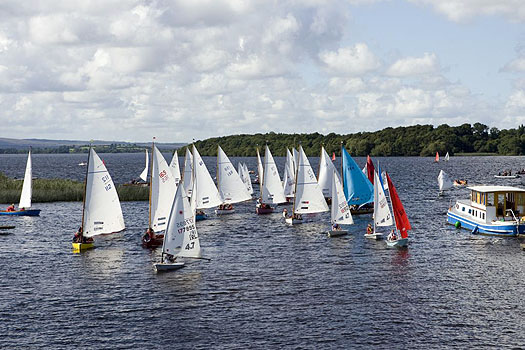
Hyper-crazy kaleidoscope – a variety of boats (with the Shannon One Designs dominant) return to port after racing at Dromineer on Lough Derg
Slipping even further under the radar of public interest are those who don't race but cruise, and those whose enthusiasm is for classic or traditional boats. We saltheads are interested in them and their boats too, but we don't expect the powers that be and the public at large to think of them (if they think of them at all) as anything other than a case of oddity just barely this side of certification.
Thus for the unfortunate folk who end up running the sailing show nationally and internationally, so diverse are the demands of the sailing population that they tend to keep their heads down, and follow the money. They'll know that those in government and disbursing public sports funding will tend to share the interests and attitudes of the general public.
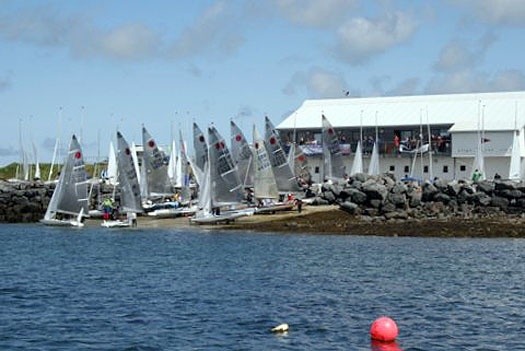
When a World Championship comes to call at one of Ireland's friendly neighbourhood club – Fireballs at Sligo YC at Rosses Point for their Worlds last year Photo: Bryan Armstrong
So as far as Irish sailing national administration is concerned, there's an enormous hunger for international sailing medals, Olympic ones preferred. If we scratched hard enough, we'd probably find that their dearest wish is that there should be a restrospective Olympic Pewter Medal for being fourth – we'd be in line for a few of those, starting with Eric Strain in the Dragon Class way back in 1948.
Sailing in all its glorious variety is one very confused picture, accompanied by a hugely complex narrative. Thus the Olympics are a Godsend for administrators, as they act as a ferociously efficient editing process. The fact that the Laser is the only Olympic class which has anything approaching global popularity is neither here nor there. Once you get into bed with the simplified Olympic machine, that's it – normality is out the window, but at least the picture is more clearcut.
Even if the format of an Olympiad only every four years means that totally-dedicated Olympic atheletes are freaks, it's a freak show which provides sailing with a useful handle for making sense of itself, and communicating with the rest of the world. But when you throw modern celebrity culture into an already toxic mix, with young sailors being led to idolize only the top stars, there's inevitably trouble. Total concentration on what's going on at the top of the pyramid means that the structure is being neglected further down, and there's distress at grass roots.
It's this concern which was aired by Norman Lee of Wicklow and Lough Derg and Bryan Armstrong of Sligo at last weekend's ISA conference, and it will be aired again in what promises to be a robust gathering in the National YC on March 23rd. Bluntly, ordinary club dinghy sailors, the backbone of much of our sport, feel that their interests are being sidelined in pursuit of the top international awards, and they see ordinary club life suffering as the focus is narrowed on the glamour events and categories.
Is what they hope for attainable? Is it really possible to get young people passionately involved in, and committed to, sailing at the local level when all of today's media are bombarding them with images of superstars in glossy boats at glamorous locations?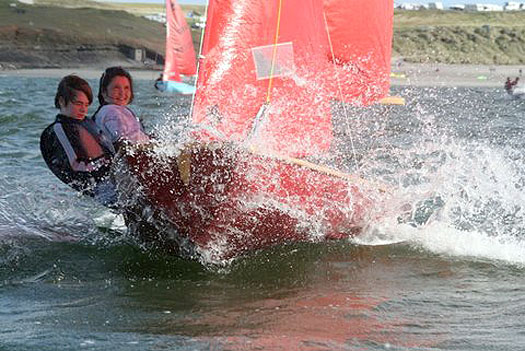
Junior dinghy sailing at its best – Mirror racing at Sligo Photo: Bryan Armstrong
One particular concern is that the sport at club level seems to suffer its greatest loss among those between 16 and 24. But is sailing unique in this? Even in everyday family life, there's a natural estrangement at this age. As Mark Twain sagely remarked: "When I was 15, my father was clearly a complete idiot. But by the time I'd become 25, it was quite extraordinary how much good sense and wisdom the old fellow had since managed to acquire".
Maybe we should accept that we have to lose them for a while, but that if and when they return to sailing, it will be as adults making their own choice, and they'll be much more useful to their club and community as a result. And with any luck they'll have learned that life for 99.99% of us is not all about four year freak shows. Life is about humdrum everyday existence, and finding a certain enjoyment in it. For sure, there'll always be those aspiring for just one single day as an eagle, rather than a hundred years as a sheep. Yet for most of us, we must worship with the God of Small Things. But whether we can expect an allocation of respect, funding and resources for this is the topic for March 23rd.
OCEAN ACHIEVEMENT
The Ocean Cruising Club, international body for those who sail the Seven Seas, has awarded major trophies to Tim Severin (he lives in Courtmacsherry in West Cork these days) and Fergus and Kay Quinlan of Kinvara in County Galway.
The Quinlan achievement, a three year voyage around the world with their own-built steel cutter Pylades, was highlighted here three weeks ago when it took the Faulkner Cup, top trophy of the Irish Cruising Club, for the third year in a row. But recognition by the Ocean Cruising Club is a salute from an organisation which has played the leading role in long distance voyaging since 1954, and it reflects great credit on Pylades and her crew.
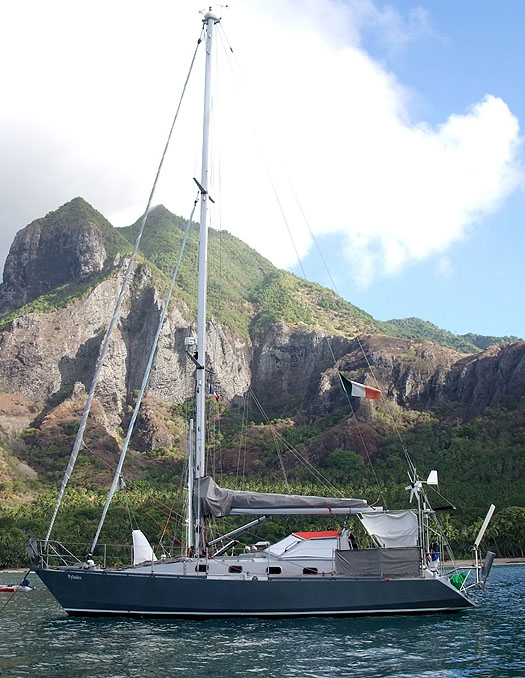
Living the Pacific cruising dream – Pylades at Nuka Hiva in the French Marquesas Photo: Fergus Quinlan
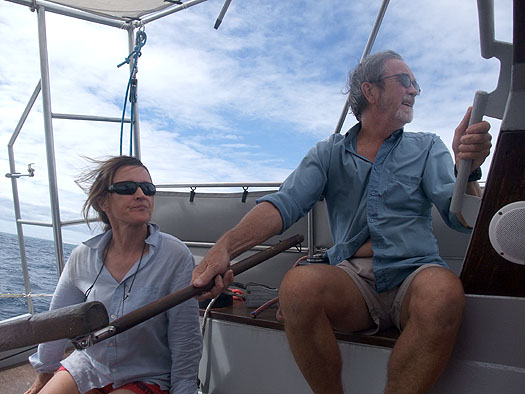
Voyaging couple: Kay and Fergus Quinlan sailing aboard Pylades off Moorea (don't tell anyone, but they were racing at the time)
Tim Severin's renowned re-enactments of ancient voyages in small and primitive craft first gained recognition with his re-creation of the Brendan voyage in a leather boat across the North Atlantic from West Kerry to North America by the northern route. He dramatically demonstrated that the long voyages of the Irish monks, assumed by many to be no more than the stuff of myth and legend, could indeed have been achieved with the boats and technology available at the time of St Brendan.
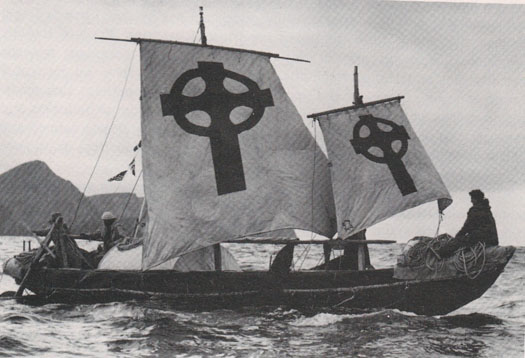
Tim Severin's St Brendan departing West Kerry at the start of the Transatlantic voyage in 1976. The "giant leather currach" was built in Crosshaven Boatyard
The founder of the Ocean Cruising Club, Humphrey Barton, had a long association with Ireland. In 1935 he raced in the Irish Cruising Club's offshore event from Howth to Peel in the Isle of Man. The winner of the stormy race was John B Kearney skippering the 38ft Mavis, which he had designed and built himself in 1923-25. However, because of the establishment of the Irish Free State in 1922 with its relative isolation in global maritime terms, Kearney's skills were virtually unknown outside Dublin. But after seeing how well Mavis raced across the Irish Sea, Barton ensured that the designer and builder from Ringsend became much more widely known, and then after Mavis was the overall winner of the Clyde Cruising Club's popular annual race to Tobermory in 1938, John Kearney's renown was assured.



























